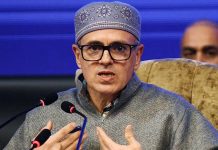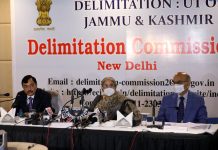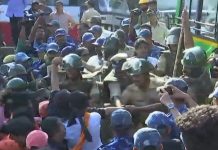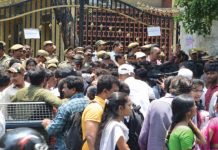
The farmer leaders are not shying away from letting their intentions known. While addressing the Mahapanchayat rally on September 5, BKU leader Rakesh Tikait declared his determination to oust the BJP government in upcoming UP polls by tapping into rural anger writes MADIHA RAZA
A communally-sensitive region, Muzaffarnagar, has always remained on the edge. Historically, Muzaffarnagar mahapanchayats plays significant role in electing and dislodging the governments. Agitations occurred in the land of Muzaffarnagar against the government witnessed its downfall since decades.
On September 5, lakhs of farmers came together to attend the Kisan Mahapanchayat in Muzaffarnagar organised by the Samyukt Kisan Morcha at Government Inter College (GIC). The farmers’ body is slated to launch “Mission Uttar Pradesh – Uttarkhand” to give a boost to their protest against Center’s farm laws.
The Mahapanchayat was largely dominated by the farmers of the western Uttar Pradesh’s Do-aba’ region (land between two rivers Ganga and Jamuna) Muzaffarnagar is known as a ‘rebellious’ area in elections, and often spring surprises. The timing of the mahapanchayat is also crucial as it is ahead of the harvest season and at a time of high inflation and high unemployment as many sectors are still struggling to recover from the impact of Covid-induced restrictions.
Anti-government slogans echoed during the Mahapanchayat, The farmers gave an ultimatum saying that either the farmers should be heard or else they will teach such a lesson to BJP in 2022 that it will never be able to come back to power.
Remarkably, the sugarcane producer belt is upset with stagnation in sugarcane prices in the state. The farmers are angry with the fact that while their input cost, such as fuel and fertilizer prices, have increased massively in the last couple of years, the prices of sugarcane produce have remained the same.
A farmer from Muzaffarnagar, Abbas Kazmi, who was present at the rally, while expressing his difficulties and criticising the government said “The prices of Diesel and Petrol are hiked every month, how farmers will do the cultivation? We will have to keep the tractor and machines at home if the price hike continues in such a way as all the machines and tractor run on fuel.
He further said, “The Government is not implementing MSP, the price of paddy in Bihar is Rs 800 per quintal and the expense to grow paddy is approximately Rs 11,000 per bigha. What the farmer will save? The 30-year-old a farmer said, “The government had promised Rs 400 per quintal of sugarcane, which is still Rs 325 per qtl, the rate which is stagnant since 2017. Why we will elect this government again?
Importance of western UP
Political observers said the bonhomie between the Jat farmers and Muslims will pose a political challenge for the ruling BJP in its strongholds on western UP.
In Western Uttar Pradesh, Jats are a decisive factor and have a substantial impact on at least 120 out of the 403 seats in Uttar Pradesh. Uttar Pradesh is set to see assembly polls in 2022.
According to the demographics, western Uttar Pradesh has 29 Lok Sabha seats, with a historically significant population of Jats, Gurjars as well as Muslims. However, Muslims constitute the single biggest electorate in all five seats consisting Budhana, Charthawal, Muzaffarnagar, Khatauli, Sardhan. With that volume of seats, the region has determined the political destiny of India on numerous occasions.
Additionally, the Dalit community constitute the second biggest chunk of voters. Jats, who dominate the landscape of Western Uttar Pradesh are also influential in the constituency.
The majority of the population of this area is involved in farming. Historically, the sugarcane producing belt has a strong influence on the political parties. However, farmers’ Muzaffarnagar meet can change political equations in UP elections.
The land is also significant because it is a birthplace of chief Kisan leader, Mahendra Singh Tikait, who was one of the founding members of the Bharatiya Kisan Union. He was born in Sisauli village in Muzaffarnagar.
Mahendra Singh Tikait led several farmers’ movements, including a gherao of the Meerut Commissionerate in January 1988, and a farmers’ seige of Delhi later that year, that consolidated his position as a foremost farmers’ leader of Muzaffarnagar.
Moreover, under Mahendra Singh Tikait, the BKU’s influence extended across Uttar Pradesh, empowering the rise of several local leaders. “More than 30 unions were formed in the entire state after the death of Mahendra Singh Tikait.”
Also, in the year 1978, Bharatiya Lok Dal was first formed under the leadership of former Prime Minister Chaudhury Charan Singh, It was reorganised in 1986, under Mahendra, as a non-partisan group.
In 1996, Mahendra allied with Ajit Singh, Charan Singh’s son, who formed the Kisan Kamgar Party. The alliance won 14 seats in that year’s Uttar Pradesh assembly election. The next year, however, Mahendra broke away from the partnership.
Currently, his sons Rakesh and Naresh Tikait have become the big face of Farmers agitation. Western Uttar Pradesh’s Muzaffarnagar, was earlier famous for its Jat-Muslim brotherhood where both the communities have performed farming together since generations.
However tragically he brotherhood ended in the aftermath of the Muzaffarnagar riots in 2013. After 2013 Muzaffarnagar riots, the city witnessed a rift between both the communities.
Remarkably, scenario has been changed once again. Both the communities have come together shoulder to shoulder for a common cause: to fight against the three farm law that government has refused to accept since last one year.
During elections in 2017, just a year after the Muzaffarnagar riots, the BJP won the general elections with a whopping majority and formed a government at the Centre. In 2017, Yogi Adityanath was made the chief minister of Uttar Pradesh after the BJP won a majority in the state assembly polls.
Political analysts say that the Muzaffarnagar 2013 riots had a central role to play in the BJP’s rise to power nationally as well as in Uttar Pradesh. But now those severed ties between Hindus and Muslims since the riots seem to be mending.
The influential western UP district had been in a grip of the Rashtriya Lok Dal until the rise of the BJP, which had managed to garner the support of influential Khaps including those headed by Rakesh Tikait and Naresh Tikait.
Sons of iconic farmers’ leader, late Mahendera Singh Tikait, who earlier mobilised farmers of western Uttar Pradesh and headed to the country’s seat of power.
Clarion call
While addressing the Mahapanchayat rally on September 5, Bharatiya Kisan Union (BKU) leader Rakesh Tikait declared his determination to oust the BJP government in upcoming Uttar Pradesh Elections by tapping into rural anger and uniting farmers and workers across religion and caste.
Farmers’ leaders made it clear that they would campaign against the BJP in UP and Uttarakhand, if their demands were not accepted. They threatened to continue the agitation till the 2024 Lok Sabha poll. “They (the Centre) said only a handful of farmers are protesting.”
Samyukt Kisan Morcha said the mission is to carry out a sustained agitation against the government to repeal the law and mobilise a large-scale farmers’ movement in the state. The Morcha had called for a Bharat Bandh on September 27.
The question arises, will the huge gathering of farmers at the Mahapanchayat impact the voting across the state of UP, or has it just been restricted to the western UP?
tehelkaletters@gmail.com













